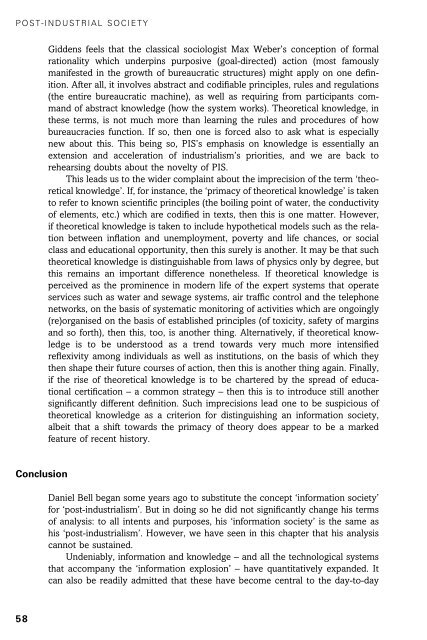Theories of the Information Society, Third Edition - Cryptome
Theories of the Information Society, Third Edition - Cryptome
Theories of the Information Society, Third Edition - Cryptome
Create successful ePaper yourself
Turn your PDF publications into a flip-book with our unique Google optimized e-Paper software.
POST-INDUSTRIAL SOCIETY<br />
Giddens feels that <strong>the</strong> classical sociologist Max Weber’s conception <strong>of</strong> formal<br />
rationality which underpins purposive (goal-directed) action (most famously<br />
manifested in <strong>the</strong> growth <strong>of</strong> bureaucratic structures) might apply on one definition.<br />
After all, it involves abstract and codifiable principles, rules and regulations<br />
(<strong>the</strong> entire bureaucratic machine), as well as requiring from participants command<br />
<strong>of</strong> abstract knowledge (how <strong>the</strong> system works). Theoretical knowledge, in<br />
<strong>the</strong>se terms, is not much more than learning <strong>the</strong> rules and procedures <strong>of</strong> how<br />
bureaucracies function. If so, <strong>the</strong>n one is forced also to ask what is especially<br />
new about this. This being so, PIS’s emphasis on knowledge is essentially an<br />
extension and acceleration <strong>of</strong> industrialism’s priorities, and we are back to<br />
rehearsing doubts about <strong>the</strong> novelty <strong>of</strong> PIS.<br />
This leads us to <strong>the</strong> wider complaint about <strong>the</strong> imprecision <strong>of</strong> <strong>the</strong> term ‘<strong>the</strong>oretical<br />
knowledge’. If, for instance, <strong>the</strong> ‘primacy <strong>of</strong> <strong>the</strong>oretical knowledge’ is taken<br />
to refer to known scientific principles (<strong>the</strong> boiling point <strong>of</strong> water, <strong>the</strong> conductivity<br />
<strong>of</strong> elements, etc.) which are codified in texts, <strong>the</strong>n this is one matter. However,<br />
if <strong>the</strong>oretical knowledge is taken to include hypo<strong>the</strong>tical models such as <strong>the</strong> relation<br />
between inflation and unemployment, poverty and life chances, or social<br />
class and educational opportunity, <strong>the</strong>n this surely is ano<strong>the</strong>r. It may be that such<br />
<strong>the</strong>oretical knowledge is distinguishable from laws <strong>of</strong> physics only by degree, but<br />
this remains an important difference none<strong>the</strong>less. If <strong>the</strong>oretical knowledge is<br />
perceived as <strong>the</strong> prominence in modern life <strong>of</strong> <strong>the</strong> expert systems that operate<br />
services such as water and sewage systems, air traffic control and <strong>the</strong> telephone<br />
networks, on <strong>the</strong> basis <strong>of</strong> systematic monitoring <strong>of</strong> activities which are ongoingly<br />
(re)organised on <strong>the</strong> basis <strong>of</strong> established principles (<strong>of</strong> toxicity, safety <strong>of</strong> margins<br />
and so forth), <strong>the</strong>n this, too, is ano<strong>the</strong>r thing. Alternatively, if <strong>the</strong>oretical knowledge<br />
is to be understood as a trend towards very much more intensified<br />
reflexivity among individuals as well as institutions, on <strong>the</strong> basis <strong>of</strong> which <strong>the</strong>y<br />
<strong>the</strong>n shape <strong>the</strong>ir future courses <strong>of</strong> action, <strong>the</strong>n this is ano<strong>the</strong>r thing again. Finally,<br />
if <strong>the</strong> rise <strong>of</strong> <strong>the</strong>oretical knowledge is to be chartered by <strong>the</strong> spread <strong>of</strong> educational<br />
certification – a common strategy – <strong>the</strong>n this is to introduce still ano<strong>the</strong>r<br />
significantly different definition. Such imprecisions lead one to be suspicious <strong>of</strong><br />
<strong>the</strong>oretical knowledge as a criterion for distinguishing an information society,<br />
albeit that a shift towards <strong>the</strong> primacy <strong>of</strong> <strong>the</strong>ory does appear to be a marked<br />
feature <strong>of</strong> recent history.<br />
Conclusion<br />
Daniel Bell began some years ago to substitute <strong>the</strong> concept ‘information society’<br />
for ‘post-industrialism’. But in doing so he did not significantly change his terms<br />
<strong>of</strong> analysis: to all intents and purposes, his ‘information society’ is <strong>the</strong> same as<br />
his ‘post-industrialism’. However, we have seen in this chapter that his analysis<br />
cannot be sustained.<br />
Undeniably, information and knowledge – and all <strong>the</strong> technological systems<br />
that accompany <strong>the</strong> ‘information explosion’ – have quantitatively expanded. It<br />
can also be readily admitted that <strong>the</strong>se have become central to <strong>the</strong> day-to-day<br />
58
















